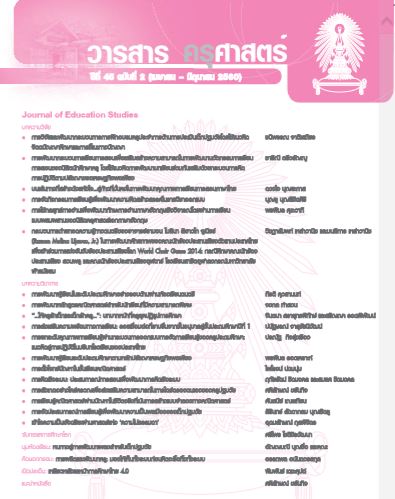การสังเกตอย่างใคร่ครวญเพื่อส่งเสริมความสามารถในการไตร่ตรองตนเองของครูปฐมวัย
Keywords:
การประเมินเด็กปฐมวัย, ครูปฐมวัย, การไตร่ตรองตนเอง, ASSESSING YOUNG CHILDREN, EARLY CHILDHOOD TEACHERS, SELF-REFLECTIONAbstract
การสังเกตอย่างใคร่ครวญเป็นเครื่องมือพัฒนาความสามารถในการไตร่ตรองตนเองของครูปฐมวัย โดยสร้างโอกาสให้ได้ฝึกฝนการสังเกตใน 2 ลักษณะ ได้แก่ การสังเกตตนเอง ผ่านการฝึกสติรู้ตัวและการทำงานศิลปะ และการสังเกตสิ่งภายนอก โดยสังเกตสิ่งที่ไม่มีชีวิต เช่น ก้อนหิน ต้นไม้ และสังเกตเด็กอนุบาลซึ่งมีชีวิตจิตใจ ทั้งนี้จำเป็นต้องใช้คำถามกระตุ้นเพื่อให้ครูเคลื่อนระดับจากการไตร่ตรองตนเองในระดับผิวไปสู่ระดับที่ลึกขึ้น ร่วมกับการใช้บันทึกสะท้อนการเรียนรู้รายบุคคลซึ่งเป็นเทคนิคที่เป็นประโยชน์ในการพัฒนาความสามารถในการไตร่ตรองตนเอง โดยตั้งคำถามให้ครูได้ทบทวนเหตุผลหรือเบื้องหลังการแสดงพฤติกรรมต่าง ๆ ประกอบกับการให้ข้อมูลป้อนกลับเป็นระยะในระหว่างการเรียนรู้ และในวงสุนทรียสนทนาช่วยให้ครูเข้าใจกระบวนในการไตร่ตรองตนเองมากขึ้น
คุณภาพการประเมินเด็กจะเกิดขึ้นได้ย่อมขึ้นอยู่กับความสามารถของครูในการดำเนินการอย่างเป็นระบบและปราศจากอคติ เพื่อให้ได้ข้อมูลพัฒนาการและการเรียนรู้ของเด็กตามความเป็นจริง อันจะนำไปสู่การออกแบบการจัดการเรียนการสอนที่สอดคล้องกับความต้องการจำเป็นและความสนใจของเด็กในชั้นเรียนอย่างแท้จริงโดยอาศัยการไตร่ตรองตนเองอย่างสม่ำเสมอ การประเมินพัฒนาการและการเรียนรู้ของเด็กปฐมวัยที่มีความเป็นธรรมจะเกิดขึ้นได้ เมื่อครูตระหนักรู้ต่ออคติ ความคาดหวัง และความลำเอียงที่มีอยู่ภายในใจ จำเป็นอย่างยิ่งที่ครูต้องห้อยแขวนการตัดสินใดใดที่เกิดขึ้นในระหว่างการสังเกตเด็ก ครูต้องเปิดใจ รับฟัง ไม่รีบตัดสิน และไวต่อการตอบสนองต่อเด็ก ซึ่งสร้างให้เกิดความรู้สึกเห็นใจและความจริงใจในปฏิสัมพันธ์ที่เกิดขึ้นระหว่างครูที่มีสติรู้ตัวและเด็กในชั้นเรียน
Contemplative observation is a key tool for developing early childhood teachers’ self-reflection abilities. The opportunities for two-style-observing practices should be created for teachers: one is self-observing with mindfulness practice and doing art; the other is observing non-living objects and preschoolers’ feeling and thinking. Hence, questions and individual self-reflection note-taking must be used together to stimulate teachers to develop their self-reflection from the surface to deeper levels. Questions must provoke teachers to reconsider the reasons or motives for their show behaviorally. Feedback should be given regularly while learning and when dialoguing to help teachers understand more on self -reflection processes.
The quality of assessing children depends on teachers’ systematical assessment without prejudice. By this means, authentic information on children’s development and learning can be gathered. Then, instructions can be designed in congruence with children’s needs and interests. Fair assessment on early childhood development and leaning can be done only when teachers are aware of their own prejudices, expectations, and biases. Therefore, in every case, teachers must suspend any thoughts or judgments when observing children. They need to be open-minded when listening to children, not rush in making any judgments, and be expeditious towards children’s responses. Mindful teachers with these qualifications will show empathy and be trustworthy when interacting with young children in classrooms.




